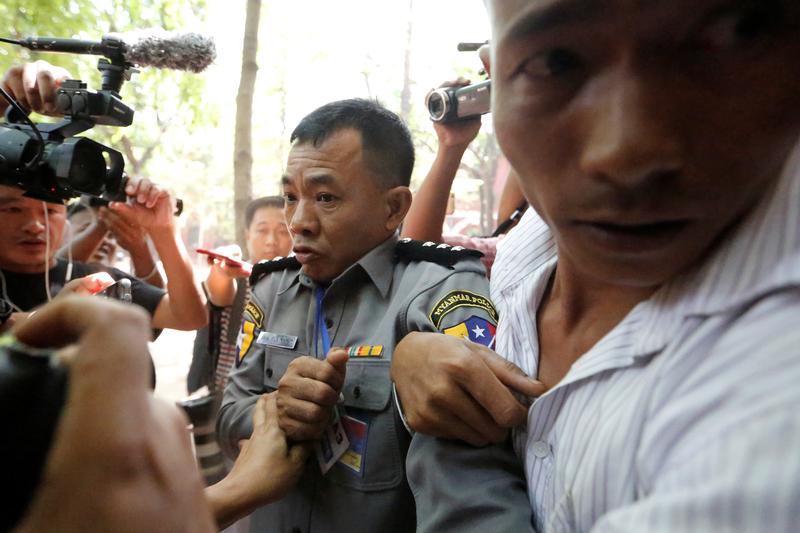Legal wrangling in the case of two Reuters journalists accused of violating Burma’s Official Secrets Act continued on Wednesday as the presiding judge heard arguments for and against the designation of a “hostile witness” who gave explosive testimony late last week.
Police Captain Moe Yan Naing shook up court proceedings on Friday, saying the two Reuters reporters had been entrapped by law enforcement when they were arrested on 12 December, allegedly in possession of sensitive government documents. The defendants, Wa Lone, 32, and Kyaw Soe Oo, 28, are facing up to 14 years in prison under the colonial-era Official Secrets Act.
Prosecutor Kyaw Min Aung told the court on Wednesday that the testimony of Moe Yan Naing last week could not be assumed to be truthful and that the witness was angry with the police force because he had been detained for more than 120 days at the No. 8 Security Police Command post in Yangon. Moe Yan Naing was arrested along with Police Sergeant Khin Maung Lin on the same day as the Reuters duo.
As a witness for the prosecution, Moe Yan Naing apparently went off-script on Friday when he told Yangon’s Northern District Court that the Reuters journalists had been set up by Police Brigadier-General Tin Ko Ko — handed secret government documents by police officers during a meeting at a restaurant, and arrested shortly thereafter.
Kyaw Min Aung also said that Tin Ko Ko harboured no animus toward the two Reuters journalists, and that the police brigadier-general could not have ordered their arrest even if he did.
A lawyer for the defence, Khin Maung Zaw, objected to that assertion and said the prosecution had failed to provide evidence in support of its arguments.
Khin Maung Zaw also attempted to impress upon the judge the international attention that the case has garnered since his clients first appeared in court in January, and urged that the presiding magistrate consider carefully the arguments made by both sides before making his ruling.
Much of that international attention has stemmed from two factors: the reporters’ affiliation with a major international news outlet, and the fact that they were working on an in-depth exposé of a massacre of Rohingya Muslims in the Rakhine State village of Inn Din when they were arrested. The Inn Din incident has served as an anchor point for critics of the Burmese government, which has been accused of — and vehemently denies — “ethnic cleansing” of the Rohingya population in Rakhine State.
[related]
The judge, Ye Lwin, told the court on Wednesday that he would rule on the “hostile witness” designation at the next hearing on 2 May, and he asked the lead prosecutor that Moe Yan Naing be present for next week’s court proceedings.
Than Zaw Aung, a lawyer for the defendants, said that if the judge declares Moe Yan Naing a hostile witness, he will be put on the stand to testify again, but that his previous testimony will be stricken from the court record.
Speaking after Wednesday’s hearing, defendant Wa Lone told reporters he would like to see Moe Yan Naing and his police colleague Khin Maung Lin released, saying the two officers were not guilty of any crime.
“The truth is going to appear soon,” Wa Lone said.



